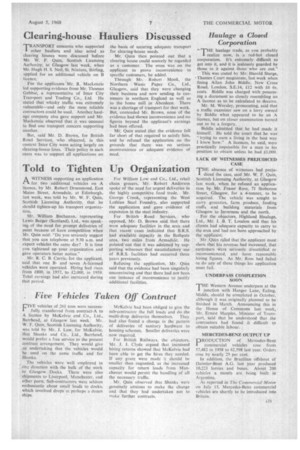Clearing-house Hauliers Discussed
Page 33

If you've noticed an error in this article please click here to report it so we can fix it.
TRANSPORT concerns who supported 1 other hauliers and also acted as clearing houses were discussed before Mr. W. F. Quin, Scottish Licensing Authority, at Glasgow last week, when Mr. Hugh H. S. Neil, St. Ninians, Stirling, applied for an additional vehicle on B licence.
For the applicants 'Mr. R. Mackenzie led supporting evidence from Mr. Thomas Gebbie, a representative of Inter City Transport and Trading Co., Ltd. Ile stated that whisky traffic was extremely vulnerable—and only the most reliable contractors could be used. Another haulage company also gave support and Mr. Mackenzie observed that it was unusual to find one transport concern supporting another.
But, said Mr. D. Brown, for British Road Services, who objected, in this context Inter City were acting largely on clearing-house lines. Their policy in such cases was to support all applications on the basis of securing adequate transport for clearing-house needs.
Mr. Quin then pointed out that a clearing house could scarcely be regarded as a customer. The onus was on the applicant to prove inconvenience to specific customers, he added.
Through Mr. Robert Monk, the Northern Waste Paper Co., Ltd., Glasgow, said that they were changing their business and now sending to customers in northern England as well as to the home mill in Aberdeen. There was a shortage of transport for that work. But, contended Mr. Brown, none of the evidence had shown inconvenience and no figures beyond the applicant's earnings had been offered.
Mr. Quin stated that the evidence fell far short of that required to satisfy him, and he refused the application on the grounds that there was no serious inconvenience or adequate evidence of need.




































































































